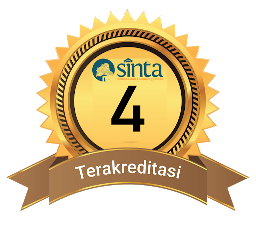Effectiveness of Problem Based Learning Model on Student Learning Outcomes of Grade XI on Reaction Rate Material
DOI:
10.29303/cep.v8i1.9001Published:
2025-06-03Issue:
Vol. 8 No. 1 (2025): Edisi MeiKeywords:
Problem Based Learning, Effectiveness, Learning Outcomes, Reaction RateArticles
Downloads
How to Cite
Abstract
Research has been conducted on the effectiveness of Problem Based Learning model on the learning outcomes of Class XI students of SMAN 3 Sampolawa on reaction rate material. This study aims to determine the effectiveness of Problem Based Learning model on student learning outcomes on reaction rate material. The subjects in this study were 25 students of class XI MIPA 1. This type of research is pre-experiment with One Group Pretest-Posttest design. The research instruments included a learning outcome test consisting of 20 multiple choice questions and an observation sheet. The results showed that the average pretest score of 29.6 increased to 77.2 in the posttest. The effectiveness of learning based on the N-Gain value of 0.68 is included in the medium category, so the Problem Based Learning model is declared effective in improving student learning outcomes. Students' responses to the learning model were classified as very good, while the implementation of learning by teachers and students was considered good and experienced an increase.
Keywords: Effectiveness, Problem Based Learning, Learning Outcomes, Reaction Rate
References
Arikonto, S. (2002). Prosedur Penelitian Suatu Pendekatan Praktis. Jakarta : Rineka Cipta.
Arikunto, S. (2013). Prosedur Penelitian Suatu Pendekatan Praktek Edisi Revisi. 14th ed. Jakarta: Rineka Cipta.
Ayunda, S. N., Lufri, L., & Alberida, H. (2023). Pengaruh Model Pembelajaran Problem Based Learning (PBL) Berbantuan LKPD terhadap Kemampuan Berpikir Kritis Peserta Didik. Journal on Education. 5(2). 5000-5015.
Basit, D. A., Muslim, B., & Saridewi, N. (2023). Pengaruh Model Problem Based Learning Berbasis Etnosains terhadap Hasil Belajar Siswa pada Materi Laju Reaksi. Jurnal Kimia dan Pendidikan Kimia. 5 (1).
Hadewia, S. (2022). Analisis Kesulitan Belajar Siswa pada Mata Pelajaran Kimia Kelas XI di MAN 2 Kota Palu. Jurnal Kolaboratif Sains. 5(10). 702.
Indarlia, C., Nurlansi., & Maysara. (2022). Efektivitas Model Pembelajaran Problem Based Learning Pada Materi Larutan Elektrolit dan Non Elektrolit. Jurnal Pendidikan Kimia .7 (3).
Ismanida, D. P., Enawaty, E., Lestari, I., Erlina, E., & Ulfah, M. (2022). Pengembangan E-modul Laju Reaksi Menggunakan Model Problem Based Learning. Edukatif: Jurnal Ilmu Pendidikan. 4(6). 8251-8261.
Kasmantoro, H., Patonah, S., & Maryati, M. (2024). Efektivitas Model Problem Based Learning terhadap Peningkatan Hasil Belajar Matematika Materi Pecahan Fase A. ANARGYA: Jurnal Ilmiah Pendidikan Matematika. 7(1). 24-31.
Minarni, M., Epinur, E., Yusnidar, Y., Syahri, W., Rusdi, R., & Afrida, A. (2023). Penggunaan Laboratorium Virtual Materi Laju Reaksi untuk Meningkatkan Hasil Belajar Siswa SMAN 3 Muaro Jambi. DEDIKASI: Jurnal Pengabdian Masyarakat. 5(1). 11-18.
Nurlaela, E. U. 2019. Chemistry Stortell” Inovasi Literasi Pembelajaran Kimia. In Prosiding SNPS (Seminar Nasional Pendidikan Sains) (pp. 143-151). Surabaya.
Pamungkas, A. (2022). Penerapan Model Pembelajaran Problem Based Learning untuk Meningkatkan Hasil Belajar Kimia Laju Reaksi. Jurnal Pendidikan dan Profesi Guru. 2 (1).
Purba, E., & Munzirwan, R. (2022). Penerapan Model Pembelajaran Problem Based Learning Terhadap Hasil Belajar dan Minat Siswa pada Materi Laju di SMA Katolik Medan XI IPA 4. Educater. Jurnal Ilmiah Pendidikan. 1(6).382.
Riani, I. F., Sulaiman, S., & Mislinawati, M. (2017). Kendala Guru Dalam menerapkan Model Pembelajaran pada Pembelajaran Tematik Berdasarkan Kurikulum 2013 di SD Negeri 2 Kota Banda Aceh kendala Guru dalam menerapkan Model Pembelajaran pada Pembelajaran Tematik Berdasarkan Kurikulum 2013 di SD Negeri 2 Kota Banda Aceh. Elementary Education Research. 2(2): 92
Sugiyono. (2018). Metode Penelitian. Bandung: Alfabet.
Supiana., Saefuddin., & Maysara. (2019). Keefektifan Model Pembelajaran Penemuan (Discovery Learning) Untuk Meningkatkan Hasil Belajar Siswa Pada Materi Laju Reaksi. Jurnal Pendidikan Kimis Universitas Halu Oleo. 4 (1).
Swiyadnya, I. M. G., Wibawa, I. M. C., & Sudiandika, I. K. A. (2021). Efektivitas Model Problem Based Learning Berbantuan LKPD Terhadap Hasil Belajar Muatan Pelajaran IPA. Mimbar PGSD Undiksha. 9(2). 203-210.
Author Biographies
Desti Desti, Universitas Halu Oleo
Esnawi Esnawi, Universitas Halu Oleo
Maysara Maysara, Universitas Halu Oleo
License
Copyright (c) 2025 Desti Desti, Esnawi Esnawi, Maysara Maysara

This work is licensed under a Creative Commons Attribution-ShareAlike 4.0 International License.
Authors who publish with Chemistry Education Practice agree to the following terms:
- Authors retain copyright and grant the journal right of first publication with the work simultaneously licensed under a Creative Commons Attribution License 4.0 International License (CC-BY-SA License). This license allows authors to use all articles, data sets, graphics, and appendices in data mining applications, search engines, web sites, blogs, and other platforms by providing an appropriate reference. The journal allows the author(s) to hold the copyright without restrictions and will retain publishing rights without restrictions.
- Authors are able to enter into separate, additional contractual arrangements for the non-exclusive distribution of the journal's published version of the work (e.g., post it to an institutional repository or publish it in a book), with an acknowledgement of its initial publication in Chemistry Education Practice.
- Authors are permitted and encouraged to post their work online (e.g., in institutional repositories or on their website) prior to and during the submission process, as it can lead to productive exchanges, as well as earlier and greater citation of published work (See The Effect of Open Access).






